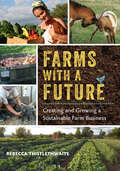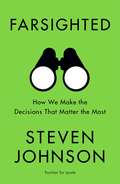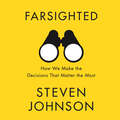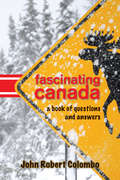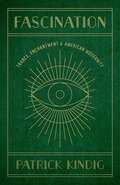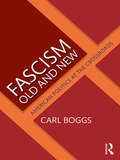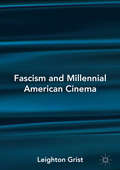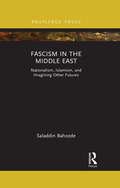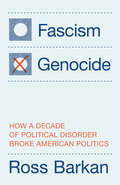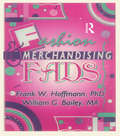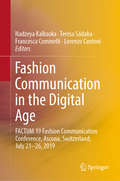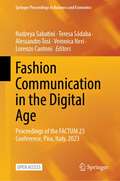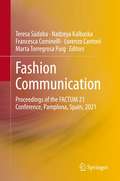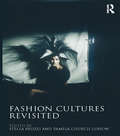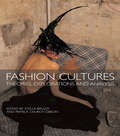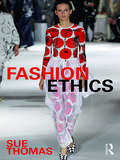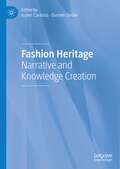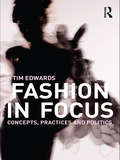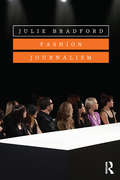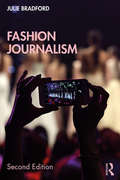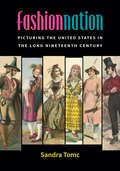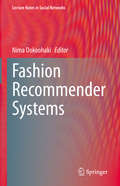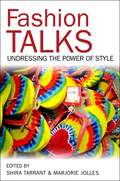- Table View
- List View
Farms and Farmers in an Urban Age
by Edward C. HigbeeAccount of the evolution of American agriculture and its influence on the nation.
Farms with a Future: Creating and Growing a Sustainable Farm Business
by Rebecca ThistlethwaiteWhat makes a farm sustainable and successful? And what special qualities and skills are needed for someone to become a successful farmer?Rebecca Thistlethwaite addresses these and other crucial questions in this uniquely important book, which is a must-read for anyone who aspires to get into farming, or who wants to make their farm business more dynamic, profitable, and, above all, sustainable. Over an entire year, the author and her husband-experienced farmers themselves-took a sabbatical and traveled the length and breadth of the United States to live and work alongside some of the nation's most innovative farmers. Along the way they learned about best practices, and a whole lot about what doesn't work.Farms with a Future shares this collective wisdom in an inspirational yet practical manner; it will help beginners avoid many of the common mistakes that first-time farmers make. Just as importantly, it discusses positive ideas that can help make any farm enterprise vibrant and financially profitable. Profiles of more than a dozen representative farms help round out the invaluable information and encourage farmers to embrace their inner entrepreneur. Younger growers, in particular, will benefit by learning about "the right stuff" from both their peers and longtime experts.This book provides a useful reference for beginning and experienced farmers alike. While many other books address agricultural production, there are very few that talk about business management for long-term sustainability. Farms with a Future offers an approachable, colorful take on building a triple-bottom-line farming business.
Farsighted: How We Make the Decisions that Matter the Most
by Steven JohnsonPlenty of books offer useful advice on how to get better at making quick-thinking, intuitive choices. But what about more consequential decisions, the ones that affect our lives for years, or centuries, to come? Our most powerful stories revolve around these kinds of decisions: where to live, whom to marry, what to believe, whether to start a company, how to end a war.Full of the beautifully crafted storytelling and novel insights that Steven Johnson's fans know to expect, Farsighted draws lessons from cognitive science, social psychology, military strategy, environmental planning, and great works of literature. Everyone thinks we are living in an age of short attention spans, but we've actually learned a lot about making long-term decisions over the past few decades. Johnson makes a compelling case for a smarter and more deliberative decision-making approach. He argues that we choose better when we break out of the myopia of single-scale thinking and develop methods for considering all the factors involved.There's no one-size-fits-all model for the important decisions that can alter the course of a life, an organization, or a civilization. But Farsighted explains how we can approach these choices more effectively, and how we can appreciate the subtle intelligence of choices that shaped our broader social history.
Farsighted: How We Make the Decisions that Matter the Most
by Steven JohnsonA groundbreaking book about making once-in-a-lifetime decisions, from the bestselling author of How We Got to Now and Where Good Ideas Come From.Plenty of books offer useful advice on how to get better at making quick-thinking, intuitive choices. But what about more consequential decisions, the ones that affect our lives for years, or centuries, to come? Our most powerful stories revolve around these kinds of decisions: where to live, whom to marry, what to believe, whether to start a company, how to end a war.Full of the beautifully crafted storytelling and novel insights that Steven Johnson's fans know to expect, Farsighted draws lessons from cognitive science, social psychology, military strategy, environmental planning, and great works of literature. Everyone thinks we are living in an age of short attention spans, but we've actually learned a lot about making long-term decisions over the past few decades. Johnson makes a compelling case for a smarter and more deliberative decision-making approach. He argues that we choose better when we break out of the myopia of single-scale thinking and develop methods for considering all the factors involved.There's no one-size-fits-all model for the important decisions that can alter the course of a life, an organization, or a civilization. But Farsighted explains how we can approach these choices more effectively, and how we can appreciate the subtle intelligence of choices that shaped our broader social history.(P)2018 Penguin Random House Audio
Farther and Faster
by Tara Funk Katherine ScraperHow did people go places long ago? How do people go places now?
Fascinating Canada: A Book of Questions and Answers
by John Robert ColomboFew people have read as widely in the field of Canadiana as has John Robert Colombo. The curiosity of this Toronto writer, editor, and anthologist knows few if any bounds when it comes to the lore, literature, history, culture, and character of Canada. He has an inquiring mind and he seems able to find national and even international twists to subjects of interest or importance.Fascinating Canada, his latest book, is the product of over half a century of research, reading, writing, and thinking. Some years ago the author produced a trilogy of question-and-answer books 1,000 Questions about Canada, 999 Questions about Canada, 1,000 Questions about Canada. The first two were published by Doubleday Canada, the third one in 2001 by Dundurn Press. The same format is adapted to the material in the present book, but this time the majority of the questions are short whereas a good many of the answers are quite long discussions of the subjects at hand: concise questions followed by considered answers.Here is a book about the Canadian past, present, and future. The information in Fascinating Canada is organized under four headings (People, Places, Things, Ideas) and there is a detailed Index for ready reference. This book may serve as a work of popular reference, but it has been written to stimulate inquiry and spark the sense of surprise in the minds of readers who know something about this amazing country but perhaps not as much as the author. Open this book and begin to read … and match wits with author and researcher John Robert Colombo.
Fascination: Trance, Enchantment, and American Modernity
by Patrick KindigMost cultural critics theorize modernity as a state of disenchanted distraction, one linked to both the rationalizing impulses of scientific and technological innovation and the kind of dispersed, fragmented attention that characterizes the experience of mass culture. Patrick Kindig’s Fascination, however, tells a different story, showing that many fin-de-siècle Americans were in fact concerned about (and intrigued by) the modern world’s ability to attract and fix attention in quasi-supernatural ways. Rather than being distracting, modern life in their view had an almost magical capacity to capture attention and overwhelm rational thought.Fascination argues that, in response to the dramatic scientific and cultural changes of the late nineteenth and early twentieth centuries, many American thinkers and writers came to conceive of the modern world as fundamentally fascinating. Describing such diverse phenomena as the electric generator, the movements of actresses, and ethnographic cinema as supernaturally alluring, they used the language of fascination to process and critique both popular ideologies of historical progress and the racializing logic upon which these ideologies were built. Drawing on an archive of primary texts from the fields of medicine, (para)psychology, philosophy, cultural criticism, and anthropology—as well as creative texts by Harriet Prescott Spofford, Charles Chesnutt, Theodore Dreiser, Paul Laurence Dunbar, Edward S. Curtis, Robert J. Flaherty, and Djuna Barnes—Kindig reconsiders what it meant for Americans to be (and to be called) modern at the turn of the twentieth century.
Fascism Old and New: American Politics at the Crossroads
by Carl BoggsDeep historical trends suggest the United States could be moving toward a distinctly novel form of fascism, embracing elements of the historical phenomenon as it appeared in such countries as Italy, Germany, Japan, and Spain while departing in significant ways. A twenty-first century fascism would hardly be revolutionary or totalitarian, as it would involve no dramatic break with the past, following a logic of continuity and building on firmaments of entrenched power going back to World War II. This new type of fascist regime would be driven by a tightening confluence of sectoral interests in American society: corporate, state, military, and cultural – interests favoring oligarchy, authoritarianism, the warfare system, and surveillance order within an expanding globalized matrix of power. The dominant historical forces emphasized by such theorists as C. Wright Mills (The Power Elite) and Sheldon Wolin (Democracy, Inc.), an important foundation of this book, have grown stronger and more pervasive across the decades. An integrated power structure has been fueled by new advances in technology, a money-saturated political system, and neoliberal globalism bolstered by the spread of right wing populism that, among other things, has catapulted Donald Trump into the U.S. presidency. In this book, Carl Boggs explores new political and ideological terrain in systematically considering the prospects for a gradual development of fascism in contemporary American society and, by extension, elsewhere across the advanced industrial world. He persuasively argues that modern fascistic trends, arguably most visible in the U.S., demonstrate a closer affinity with Mussolini’s Italy (corporate state) than with the more extreme Nazi German model of tyranny and genocide. A very timely scholarly enterprise, this book will be of interest to students of contemporary radical politics, fascism more broadly, US political history, ideologies and party politics.
Fascism and Millennial American Cinema
by Leighton GristThis book examines a spate of American films released around the turn of the millennium that differently address the actuality or possibility of domestic fascism within the USA. The films discussed span a diversity of forms, genres and production practices, and encompass low- and medium-budget studio and independent releases (such as American History X, Stir of Echoes and The Believer), star and/or auteur vehicles (such as The Siege, Fight Club and American Beauty), and high-budget, high-concept science-fiction films and franchises (such as Starship Troopers, Minority Report, the Matrix and X-Men trilogies and the Star Wars prequels). Central to the book is the detailed analysis of the films, which is contextualized historically in relation to a period that saw the significant rise of the far Right. The book concordantly affords a wider insight into fascism and its various manifestations and how such have been, and continue to be, registered within American cinema.
Fascism in the Middle East: Nationalism, Islamism, and Imagining Other Futures (Routledge Focus on Modern Subjects)
by Saladdin BahozdeFollowing decades of brutal campaigns against left forces, fascism in its nationalist and religious forms has been dominating Turkish, Iranian, and Arab politics for over half a century. At first, with key enemies vanquished, military generals assumed power and established some of the most terroristic totalitarian regimes in the 20th Century. It only followed that Islamist organizations then hijacked democratic movements of dissent. Now, in countries and territories where they have assumed state power, Islamist forces have surpassed all nationalist dictatorships for their utter disrespect of human lives.Today, Islamism subordinates peoples in the Middle East. Bearing the urgency of our times, Saladdin Bahozde problematizes all forms of fascist exclusionism in the region, while drawing attention to anti-fascist resistance and progressive alternatives there. As a critique of identitarianism and right-wing politics in the Middle East and North Africa, the work calls for a global movement, as endorsed by the peoples of the region, to go beyond nationalism and Islamism.
Fascism or Genocide: How a Decade of Political Disorder Broke American Politics
by Ross BarkanA deeply reported look at how polarization and compounding crises, including the war in Gaza and threats to democracy, have reshaped American politicsFascism or Genocide is New York Times Magazine writer Ross Barkan&’s sweeping report on the 2024 US election and the decade of political upheaval leading up to it.As in 2020, Joe Biden campaigned on a platform to save democracy, but fewer voters were persuaded this time. During the Democratic primary season, more than half a million Americans cast votes for &“Uncommitted&” ballot options to send Biden a message about the urgent need to end the killing in Gaza, with some tagging him &“Genocide Joe.&”In contrast, mainstream liberals backed the Democratic ticket in the belief that Trump would put America on the road to fascism. As the director of an influential Palestinian advocacy group tells Barkan, &“It&’s a choice between fascism or genocide.&”Biden&’s withdrawal from the election and Kamala Harris&’s subsequent nomination barely changed the narrative. Millions of Democrats stayed home after souring on the party, while others switched allegiance and got behind the Trump team. Fascism or Genocide takes a hard, informed look at the election, focusing on the future of the Democratic Party, the influence and potential of the progressive &“Squad,&” and ongoing culture wars within the party.
Fashion & Merchandising Fads
by Frank Hoffmann Beulah B RamirezFads by nature and by definition are hard to capture, yet Hoffmann and Bailey have captured over one hundred of the passing fashion fancies and merchandising miracles during America’s short history in their latest collection of fads, Fashion & Merchandising Fads.Life devoid of fads is impossible to imagine, and the fads that do enter our lives become vehicles for amusement upon retrospection. How long any fad stays in vogue is anybody’s guess, but Hoffmann and Bailey have again found those fads that somehow took root and flourished, if only for a short period of time, in America. Concise entries describe each fad from its beginning to its demise and its devout followers. Readers are sure to recognize many of the trends and fads collected in Fashion & Merchandising Fads. A browse through the contents will have readers smiling as they remember Alex, Stroh’s Beer-Drinking Dog and “Baby On Board” Stickers Barbie Dolls and Celebrity Perfumes Convertibles, Digital Watches, and Drive-In Banking Garfield, G. I. Joe, and Handbags for Men Knickers and Matchbox Cars The Model T and the Mustang Paper Dolls and Rubik’s Cube Silly Putty, the Slinky, and Synthetics in Clothes Top Hats, the Trilby, and Twiggy VCRs, Yuppies, and ZubazEach fad featured in Fashion & Merchandising Fads is examined thoroughly and concisely by the authors. They look at the historical setting, how the trend became popular, and the people most fascinated and involved with the trend. References follow each entry to make further reading on each fad a relatively easy task for those intrigued by fads. As fads enter and encompass society for a period of time, this collection of fads, arranged alphabetically, is sure to captivate readers from beginning to end, or, in a world of fads, from the A-2 Flight Jacket to the Zipper.
Fashion Communication in the Digital Age: FACTUM 19 Fashion Communication Conference, Ascona, Switzerland, July 21-26, 2019
by Lorenzo Cantoni Nadzeya Kalbaska Teresa Sádaba Francesca CominelliThis book represents a major milestone in the endeavour to understand how communication is impacting on the fashion industry and on societal fashion-related practices and values in the digital age. It presents the proceedings of FACTUM 19, the first in a series of fashion communication conferences that highlights important theoretical and empirical work in the field. Beyond documenting the latest scientific insights, the book is intended to foster the sharing of methodological approaches, expand the dialogue between communications’ studies and fashion-related disciplines, help establish an international and interdisciplinary network of scholars, and offer encouragement and fresh ideas to junior researchers. It is of high value to academics and students in the fields of fashion communication, fashion marketing, visual studies in fashion, digital transformation of the fashion industry, and the cultural heritage dimension of fashion. In addition, it is a key resource for professionals seeking sound research on fashion communication and marketing.
Fashion Communication in the Digital Age: Proceedings of the FACTUM 23 Conference, Pisa, Italy, 2023 (Springer Proceedings in Business and Economics)
by Lorenzo Cantoni Teresa Sádaba Nadzeya Sabatini Alessandro Tosi Veronica NeriThis is an open access book. FACTUM Conference proceedings are the output of one of the few academic events of its nature happening globally, researching fashion communication from different angles and perspectives. It includes contributions from scholars studying communication and marketing, management, digital transformation, and cultural heritage, among other disciplines. This book presents papers from the third bi-annual Conference, which aims to become the major reference point in the field. These proceedings seek to promote theoretical and empirical interdisciplinary work on how various communication practices impact both the fashion industry and societal fashion-related practices and values. With these proceedings, several objectives are aimed to be achieved, namely: - to establish and consolidate an international and interdisciplinary network of scholars in the field of fashion communication; - to share methodological approaches; - to expand the dialogue between communications studies and fashion-related disciplines; - to encourage junior researchers to pursue their scientific interests in this field. Finally, the book can be used by professionals in the field of fashion communication and marketing, who are eager to access sound research in a field that is developing very fast due to its digital transformation.
Fashion Communication: Proceedings of the FACTUM 21 Conference, Pamplona, Spain, 2021
by Lorenzo Cantoni Nadzeya Kalbaska Teresa Sádaba Francesca Cominelli Marta Torregrosa PuigThese conference proceedings are the output of one of the first academic events of its nature happening globally, targeting fashion from a communication sciences perspective, including, in a broad sense, cultural heritage studies and marketing. The chapters present theoretical and empirical interdisciplinary work on how various communication practices impact the fashion industry and on societal fashion-related practices and values. The special focus of this volume is how digital transformation is changing the field and its utility to practitioners. Using these academic insights, practitioners can understand the core causes and reasons for trends and developments in the field of fashion communication and marketing.
Fashion Cultures Revisited: Theories, Explorations and Analysis
by Stella Bruzzi Pamela Church GibsonFollowing on from the ground-breaking collection Fashion Cultures, this second anthology, Fashion Cultures Revisited, contains 26 newly commissioned chapters exploring fashion culture from the start of the new millennium to the present day. The book is divided into six parts, each discussing different aspects of fashion culture: Shopping, spaces and globalisation Changing imagery, changing media Altered landscapes, new modes of production Icons and their legacies Contestation, compliance, feminisms Making masculinities Fashion Cultures Revisited explores every facet of contemporary fashion culture and the associated spheres of photography, magazines and television, and shopping .Consequently it is an ideal companion to those interested in fashion studies, cultural studies, art, film, fashion history, sociology and gender studies.
Fashion Cultures: Theories, Explorations and Analysis
by Stella Bruzzi Pamela Church GibsonFrom the catwalk to the shopping mall, from the big screen to the art museum, fashion plays an increasingly central role in contemporary culture. Fashion Cultures investigates why we are so fascinated by fashion and the associated spheres of photography, magazines and television, and shopping.Fashion Cultures:* re-addresses the fashionable image, considering the work of designers from Paul Smith to Alexander McQueen and Hussein Chalayan* investigates the radicalism of fashion photography, from William Klein to Corinne Day* considers fashion for the 'unfashionable body' (the old and the big), football and fashion, and geographies of style* explores the relationship between fashion and the moving image in discussions of female cinema icons - from Grace Kelly to Gwyneth Paltrow - and iconic male images - from Cary Grant to Malcolm X and Mr Darcy - that have redefined notions of masculinity and cool* makes a significant intervention into contemporary gender politics and theory, exploring themes such as spectacle, masquerade, and the struggle between fashion and feminism.
Fashion Ethics
by Sue ThomasFashion Ethics provides a comprehensive overview of the ethical issues in the fashion industry, from collection design concept to upcycling and closed loop production. This book answers an urgent need for a comprehensive understanding of the fundamental ethics of the fashion industry. Sue Thomas goes beyond the usual contentious issues of environmental impact and human rights, taking the reader deeper into the endemic issues including sizeism, ageism, animal rights, and the lack of diversity in models and in the media. The book lays out the significant ethical issues within the fashion supply chain by mapping the lifecycle of a garment and exploring key topics such as deep ecology, cultural copyright speciesism, the role of the customer, and technology in future ethics. It also features current international industry information and industry-relevant case studies from brands, media and mobile technology, and NGOs including Oxfam (UK), Redress (Hong Kong), Nimany (US), Labor Link (US), People Tree (UK), and Peppermint (Australia). Fashion Ethics provides much-needed information for fashion students, industry professionals, and customers.
Fashion Heritage: Narrative And Knowledge Creation
by Isabel Cantista Damien Delille<p>This edited volume explores how fashion brands deal with legacy by looking at the preservation of heritage and knowledge and how this builds a bridge to the future. Bringing together different reflections from the world of fashion, from gloves to virtual jewels, from luxury brand’s digital narratives to historical contexts, each chapter offers a narrative that is contemporary, yet linked to historical contexts.<p> <p>With these narratives, the book reveals how innovation builds on heritage, and how locally rooted traditional techniques connect to contemporary global production. It illustrates how ancestral processes renew, encouraging us to produce and consume more responsibly.<p> <p>Split into three parts, the book firstly covers narrative and knowledge in different contexts before delving in to narrative, brand building and creativity with case studies. The final section centres on digital narratives with new consumers. Ultimately, this book demonstrates that multidisciplinary knowledge of the past is essential to the understanding of the contemporary.<p>
Fashion In Focus: Concepts, Practices and Politics
by Tim EdwardsThe study of fashion has exploded in recent decades, yet what this all means or quite where it might take us is not clear. This new book helps to bring fashion into focus, with a comprehensive guide to the key theories, perspectives and developments in the field. Tim Edwards includes coverage of all the major theories of fashion, including recent scholarship, alongside subcultural analysis and an in-depth look at production. Individual topics include: men’s fashion, masculinity and the suit women’s fashion and the role of sexuality children, the body and fashion the role of celebrity and designer label culture globalisation and the production of fashion. Fashion in Focus is the ideal companion for students in the arts and social sciences, especially those studying issues such as fashion, gender, sexuality and consumer culture.
Fashion Journalism
by Julie BradfordFashion Journalism presents a comprehensive overview of how fashion journalism operates and how to report on fashion. Encompassing skills for print and online media, the book includes many case studies and interviews with fashion journalists working for newspapers, magazines, broadcasting and websites, as well as with stylists, PR executives, photographers and bloggers. The first hand explanations of these roles and practical tips and advice are accompanied by analysis of examples from their work. The business of fashion and fashion PR is explained for the trainee journalist, offering practical guidance on how to report effectively on fashion – from sources and research to writing and layout., with chapter including suggested exercises and further reading. Covering a broad range of subject areas, from law and ethics and using social media to fashion theory and reporting the catwalk, this text offers everything a student or trainee needs to know to excel in fashion journalism.
Fashion Journalism
by Julie BradfordThis comprehensively revised and updated second edition of Fashion Journalism examines the vast changes within the industry and asks what they mean for the status, practices, and values of journalism worldwide. Providing first-hand guidance on how to report on fashion effectively and responsibly, this authoritative text covers everything from ideas generation to writing news and features, video production, podcasting, and styling, including advice on how to stay legally and ethically safe while doing so. The book takes in all types of fashion content – from journalism to branded content, and from individual content creation to editorial for fashion brands. It explores their common practices and priorities, while examining journalists’ claim to special status compared to other content producers. In conjunction with expanded theory and research, the book includes interviews with journalists, editors, bloggers, filmmakers, PRs, and brand content producers from the UK, the US, China, and the Middle East, to offer all a student or trainee needs to know to excel in fashion journalism.
Fashion Nation: Picturing the United States in the Long Nineteenth Century
by Sandra TomcFashion Nation argues that popular images of the United States as a place of glitter and lights, of gaudy costumes and dizzying visual surfaces—usually understood as features of technomodernity—were in fact brewed in the rich, strange world of early nineteenth-century British and European folk nationalism when nations were compelled to offer visual manifestations of their allegedly true ancestral form. Showing that folk and ethnic nationalism played a central role in writing and culture, the book draws on a rare and colorful visual archive of national costumes, cartoons, theatrical spectacles, and immersive entertainments to show how the United States sprung to life as a visual space for transatlantic audiences. Fashion Nation not only includes chapters on major U.S. travel writers like Nathaniel Parker Willis and James Fenimore Cooper, but it also presents explorations of the vogue for folk and ethnic costume, the role of Indigenous dress in Wild West spectacles, and the nationalistic décor on display at late nineteenth-century world’s fairs and amusement parks. Engagingly written and beautifully illustrated, Fashion Nation opens the door to a forgotten legacy of visual symbols that still inhabit ethnic and white nationalism in the United States today, showing how fantasies of glittery surfaces were designed to draw the eye away from a sordid history.
Fashion Recommender Systems (Lecture Notes in Social Networks)
by Nima DokoohakiThis book includes the proceedings of the first workshop on Recommender Systems in Fashion 2019. It presents a state of the art view of the advancements within the field of recommendation systems with focused application to e-commerce, retail and fashion. The volume covers contributions from academic as well as industrial researchers active within this emerging new field.Recommender Systems are often used to solve different complex problems in this scenario, such as social fashion-based recommendations (outfits inspired by influencers), product recommendations, or size and fit recommendations. The impact of social networks and the influence that fashion influencers have on the choices people make for shopping is undeniable. For instance, many people use Instagram to learn about fashion trends from top influencers, which helps them to buy similar or even exact outfits from the tagged brands in the post. When traced, customers’ social behavior can be a very useful guide for online shopping websites, providing insights on the styles the customers are really interested in, and hence aiding the online shops in offering better recommendations and facilitating customers quest for outfits. Another well known difficulty with recommendation of similar items is the large quantities of clothing items which can be considered similar, but belong to different brands. Relying only on implicit customer behavioral data will not be sufficient in the coming future to distinguish between for recommendation that will lead to an item being purchased and kept, vs. a recommendation that might result in either the customer not following it, or eventually return the item. Finding the right size and fit for clothes is one of the major factors not only impacting customers purchase decision, but also their satisfaction from e-commerce fashion platforms. Moreover, fashion articles have important sizing variations. Finally, customer preferences towards perceived article size and fit for their body remain highly personal and subjective which influences the definition of the right size for each customer.The combination of the above factors leaves the customers alone to face a highly challenging problem of determining the right size and fit during their purchase journey, which in turn has resulted in having more than one third of apparel returns to be caused by not ordering the right article size. This challenge presents a huge opportunity for research in intelligent size and fit recommendation systems and machine learning solutions with direct impact on both customer satisfaction and business profitability.
Fashion Talks: Undressing the Power of Style
by Shira Tarrant Marjorie JollesFashion Talks is a vibrant look at the politics of everyday style. Shira Tarrant and Marjorie Jolles bring together essays that cover topics such as lifestyle Lolitas, Hollywood baby bumps, haute couture hijab, gender fluidity, steampunk, and stripper shoes, and engage readers with accessible and thoughtful analyses of real-world issues. This collection explores whether style can shift the limiting boundaries of race, class, gender, and sexuality, while avoiding the traps with which it attempts to rein us in. Fashion Talks will appeal to cultural critics, industry insiders, mainstream readers, and academic experts who are curious about the role fashion plays in the struggles over identity, power, and the status quo.

